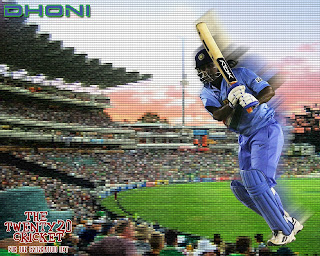
The year was 1975. The peak of the English summer. Sunil Gavaskar, India’s little master, had just played one of his trademark innings; steady, circumspect, and featuring only copybook strokes. After 60 overs, he stood undefeated on 36. It would have been the ideal test knock. Only it wasn’t a test match. Far from it. India was playing England in the opening game of the inaugural World Cup.
The results didn’t surprise anyone: a thumping victory for England. Chasing England’s mammoth 334, the Indians crawled to 132 in their quota of 60 overs. Clearly they hadn’t yet figured out one day cricket. It would be several years (and countless drubbings) before Kapil Dev Nikhanj—of the genial smile and the never-say-die spirit—would lead India to her first and only World Cup triumph. Twenty five years on, and one day cricket looks to be under serious threat from a further trimmed down version of the game: Twenty-twenty cricket!
Purists can keep whining about how the hype and the hoopla (and the scantil y clad cheerleaders) surrounding this format is degrading the game itself. The public can’t seem to get enough of it. That the Indian team was able to make an impression in the first major T20 tournament may have a lot to do with it. They won the inaugural T20 World Cup in style, beating Pakistan in the finals. The nation went mad. Mahendra Singh Dhoni and Yuvraj Singh—their test records notwithstanding—became the new poster boys of Indian cricket. They pocketed crores, appeared on every major television channel, and had a whole nation guessing as to which one of them was actually dating the ravishing Deepika Padukone.
y clad cheerleaders) surrounding this format is degrading the game itself. The public can’t seem to get enough of it. That the Indian team was able to make an impression in the first major T20 tournament may have a lot to do with it. They won the inaugural T20 World Cup in style, beating Pakistan in the finals. The nation went mad. Mahendra Singh Dhoni and Yuvraj Singh—their test records notwithstanding—became the new poster boys of Indian cricket. They pocketed crores, appeared on every major television channel, and had a whole nation guessing as to which one of them was actually dating the ravishing Deepika Padukone.
Then IPL happened. Cricket joined hands with corporate India and Bollywood. Millions of rupees were pumped into the league. The glamour quotient shot up tenfold. Cricketers—Indian and foreign—were paid astronomical fees to play in the league. The league itself was projected as the next big thing in the cricketing universe. And it worked. The fans waited with bated breath; waited for the league to get underway.
Indeed, the IPL is a marvel of modern day marketing. After India’s tremendous showing in the T20 World Cup, fans were hungry for more. Recognising the opportunity, a few enterprising men set about designing a winning product: the Indian Premier League. They displayed vision and imagination, evolving a whole new format of cricket—one featuring both Indian and overseas players; the stars and the wannabes. And once the product was ready, they went about advertising it with gusto.
And what an impact the product has had on the market; how well it has sold. Practically every game is a sell-out. When it comes to television too, the IPL games have easily displaced daily soaps from the popularity charts. The league is still only in its halfway stage but the verdict is already out: the IPL is a roaring success!
 The need to innovate; to be alive to opportunities; to think out-of-the-box; to understand consumer psyche; to promote oneself… there are plenty of lessons to be learnt from the success of brand IPL; lessons we’d do well to imbibe. We are a brand ourselves, aren’t we?
The need to innovate; to be alive to opportunities; to think out-of-the-box; to understand consumer psyche; to promote oneself… there are plenty of lessons to be learnt from the success of brand IPL; lessons we’d do well to imbibe. We are a brand ourselves, aren’t we?
- Ed.
The results didn’t surprise anyone: a thumping victory for England. Chasing England’s mammoth 334, the Indians crawled to 132 in their quota of 60 overs. Clearly they hadn’t yet figured out one day cricket. It would be several years (and countless drubbings) before Kapil Dev Nikhanj—of the genial smile and the never-say-die spirit—would lead India to her first and only World Cup triumph. Twenty five years on, and one day cricket looks to be under serious threat from a further trimmed down version of the game: Twenty-twenty cricket!
Purists can keep whining about how the hype and the hoopla (and the scantil
 y clad cheerleaders) surrounding this format is degrading the game itself. The public can’t seem to get enough of it. That the Indian team was able to make an impression in the first major T20 tournament may have a lot to do with it. They won the inaugural T20 World Cup in style, beating Pakistan in the finals. The nation went mad. Mahendra Singh Dhoni and Yuvraj Singh—their test records notwithstanding—became the new poster boys of Indian cricket. They pocketed crores, appeared on every major television channel, and had a whole nation guessing as to which one of them was actually dating the ravishing Deepika Padukone.
y clad cheerleaders) surrounding this format is degrading the game itself. The public can’t seem to get enough of it. That the Indian team was able to make an impression in the first major T20 tournament may have a lot to do with it. They won the inaugural T20 World Cup in style, beating Pakistan in the finals. The nation went mad. Mahendra Singh Dhoni and Yuvraj Singh—their test records notwithstanding—became the new poster boys of Indian cricket. They pocketed crores, appeared on every major television channel, and had a whole nation guessing as to which one of them was actually dating the ravishing Deepika Padukone.Then IPL happened. Cricket joined hands with corporate India and Bollywood. Millions of rupees were pumped into the league. The glamour quotient shot up tenfold. Cricketers—Indian and foreign—were paid astronomical fees to play in the league. The league itself was projected as the next big thing in the cricketing universe. And it worked. The fans waited with bated breath; waited for the league to get underway.
Indeed, the IPL is a marvel of modern day marketing. After India’s tremendous showing in the T20 World Cup, fans were hungry for more. Recognising the opportunity, a few enterprising men set about designing a winning product: the Indian Premier League. They displayed vision and imagination, evolving a whole new format of cricket—one featuring both Indian and overseas players; the stars and the wannabes. And once the product was ready, they went about advertising it with gusto.
And what an impact the product has had on the market; how well it has sold. Practically every game is a sell-out. When it comes to television too, the IPL games have easily displaced daily soaps from the popularity charts. The league is still only in its halfway stage but the verdict is already out: the IPL is a roaring success!
 The need to innovate; to be alive to opportunities; to think out-of-the-box; to understand consumer psyche; to promote oneself… there are plenty of lessons to be learnt from the success of brand IPL; lessons we’d do well to imbibe. We are a brand ourselves, aren’t we?
The need to innovate; to be alive to opportunities; to think out-of-the-box; to understand consumer psyche; to promote oneself… there are plenty of lessons to be learnt from the success of brand IPL; lessons we’d do well to imbibe. We are a brand ourselves, aren’t we?- Ed.

.JPG)
.JPG)







